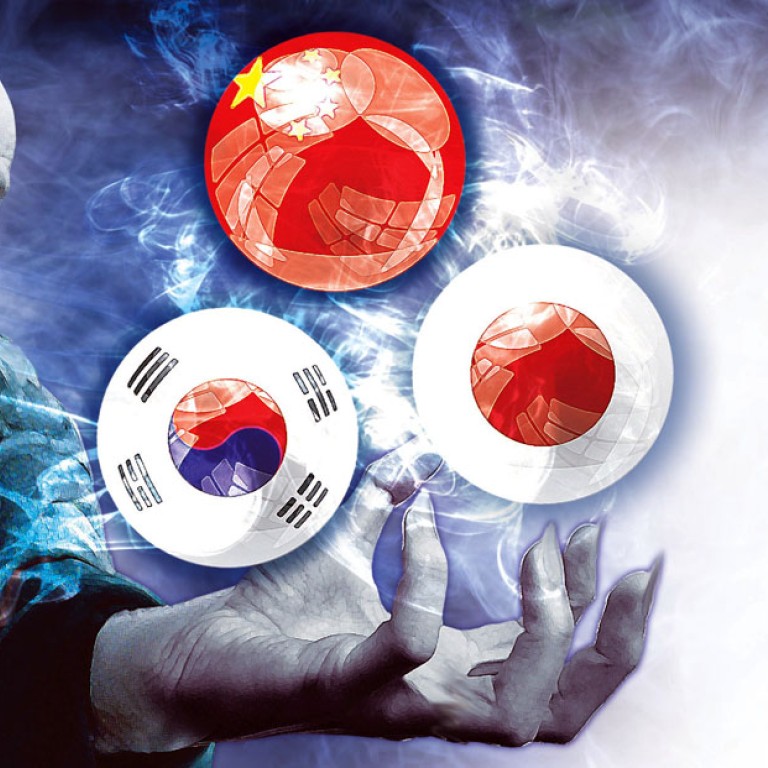
China scores in Abe row
Beijing traded barbs with Tokyo over which is more like Harry Potter's archvillainin reaction to shrine visit but also improved ties with Seoul
The jury may still be out on who is playing the role of Lord Voldemort in the row over Japanese Prime Minister Shinzo Abe's visit to the Yasukuni Shrine last month.
But so far China is reaping the benefits.

"The visit changes the story to one where Seoul and Beijing are very much on the same page, which is opposing what Abe is doing," said John Delury, an assistant professor of Chinese studies at Seoul's Yonsei University .
Abe's visit to the shrine is seen by Japan's two neighbours as righting the country's wartime atrocities as it honours Class A war criminals.
In regard to China's air defence identification zone, Seoul had responded fiercely as it overlaps its own. It denounced China's move, expended its air zone and followed the United States' in defying Chinese rules by sending fighter jets to the area without prior notice. At the time, observers warned that the diplomatic fallout could end a "honeymoon" period that saw warming of relations between the two countries since South Korea President Park Geun-hye took office in February.
Earlier this month, South Korea announced that Chinese President Xi Jinping will visit the country later this year in reciprocation for Park's trip to Beijing in June last year.
In that visit, Park bucked the tradition for South Korean leaders to visit Japan before China. The South Korean leader has distanced herself from Abe and said that a summit between the two would be "pointless" unless Japan apologised for war-time "wrongdoings".
Washington, on the other hand, has been pushing Seoul and Tokyo to repair ties. Analysts have said that strained relationships between two of the most important US allies in Asia could impede Washington's policy coordination and its influence in the region.
By offering incentives, such as addressing the North Korea nuclear crisis together and boosting economic ties, Beijing is hoping a closer relationship with South Korea would slow down Washington's strategic rebalancing towards Asia by exploiting the widening wedge between its two key allies in the region, said Cai Jian, deputy director of Fudan University's Centre for Korean Studies.
"Previously, there was little political trust between China and South Korea, partly due to the United States' moves to promote trilateral relationship among itself, Tokyo and Seoul. China has been very sensitive about this," said Cai. "Now that ties between South Korea and Japan are not moving forward, China is strengthening co-operation with Seoul and this can help to weaken the trilateral relationship [among US, Japan and South Korea]." Helping China's cause is the desire to contain the crisis in North Korea. "There is even more common ground on this between Beijing and Seoul than between Seoul and Washington," Cai said.
Seoul is hoping that Beijing can step up its pressure to restrain Pyongyang from further provocations, said Lee Ho-chul, a professor of East Asian international relations at Incheon National University in South Korea.
And despite previous reluctance on China's part to be openly critical about its long-term ally's behaviour, Lee said Xi had taken a different tack in regard to North Korea from his predecessor Hu Jintao. "The Xi leadership is stricter [with North Korea]," Lee said.
Beijing has avoided appearing to be too close to Seoul in handling Korean peninsular issues. But Xi's administration is now more willing to impose greater pressure on its long-term ideological ally as Pyongyang's provocative policies had "endangered China's interests", Cai said.
Delury from Yonsei said by forging a closer tie with Seoul, Beijing could also send a message to Kim Jong-un, the young leader of North Korea, about his actions. He recently had his uncle and once powerful official Jang Song-thaek executed. Jang was seen as the key intermediary between China and North Korea.
"The Chinese leadership wants to use good relationship with Park Geun-hye to sort of teach a lesson to Kim Jong-un," Delury said.
"There is a cost if North Korea wants to keep China at a distance, and China is going to have a better relationship with the South in many ways," he said.
South Korea's growing economic relationship with China also helps "counter the US influence", said Cai from Fudan.
Trade between China and South Korea surged by 740 per cent to US$256.6 billion between 2000 and 2012, according to the DBS Group Research. China is South Korea's biggest trading partner while China's imports from South Korea have surpassed those from Japan.
"Park's government considers ties with the US as the most important relationship for South Korea. Nonetheless, China is becoming more important too," Lee said.

